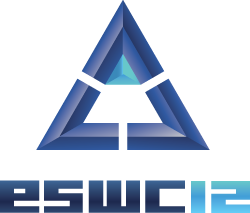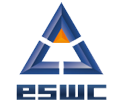Accepted Papers
Research & Special Tracks
-
Nuno Freire, Jose Borbinha and Pável Calado. An approach for Named Entity Recognition in Poorly Structured Data.
-
Craig Knoblock, Pedro Szekely, José Luis Ambite, Aman Goel, Shubham Gupta, Kristina Lerman, Parag Mallick, Maria Muslea and Mohsen Taheriyan. Semi-Automatically Mapping Structured Sources into the Semantic Web.
-
Stefan Schulte, Ulrich Lampe, Matthias Klusch and Ralf Steinmetz. COV4SWS.KOM: Information Quality-aware Matchmaking for Semantic Services C.
-
Maria Keet, Francis De La C. Fernandez Reyes and Annette Morales Gonzalez-Quevedo. Representing mereotopological relations in OWL ontologies with OntoPartS.
-
Vianney Le Clément De Saint-Marcq, Yves Deville, Christine Solnon and Pierre-Antoine Champin. Castor: a Constraint-based SPARQL Engine with Active Filter Processing.
-
Emilio Rubiera, Luis Polo, Diego Berrueta and Adil El Ghali. TELIX: An RDF-based Model for Linguistic Annotation.
-
Olaf Hartig. SPARQL for a Web of Linked Data: Semantics and Computability
-
Francois Picalausa, Yongming Luo, George H. L. Fletcher, Jan Hidders and Stijn Vansummeren. A Structural Approach to Indexing Triples.
-
Yves Raimond and Mark Sandler. Evaluation of the Music Ontology framework.
-
Despoina Magka, Boris Motik and Ian Horrocks. Modelling Structured Domains Using Description Graphs and Logic Programming.
-
Danica Damljanovic, Milan Stankovic and Philippe Laublet. Linked Data-based Concept Recommendation: Comparison of Different Methods in Open Innovation Scenario.
-
Milan Stankovic, Matthew Rowe and Philippe Laublet. Finding Co-solvers on Twitter, with a Little Help from Linked Data.
-
David Carral Martínez and Pascal Hitzler. Extending Description Logic Rules.
-
Isabelle Augenstein, Sebastian Padó and Sebastian Rudolph. LODifier: Generating Linked Data from Unstructured Text.
-
Gregoire Burel, Yulan He and Harith Alani. Automatic Identification of Best Answers in Online Enquiry Communities.
-
Fadi Maali, Richard Cyganiak and Vassilios Peristeras. A publishing pipeline for Linked Government Data.
-
Andriy Nikolov, Mathieu D'Aquin and Enrico Motta. Unsupervised Learning of Data Linking Configuration.
-
Tuukka Ruotsalo. Domain Specific Data Retrieval on the Semantic Web.
-
Miguel A. Martinez-Prieto, Mario Arias Gallego and Javier D. Fernández. Exchange and Consumption of Huge RDF Data
-
Andreas Wagner, Thanh Tran, Günter Ladwig and Andreas Harth. Top-K Linked Data Query Processing.
-
Carlo Allocca, Mathieu D'Aquin and Enrico Motta. Using Relationships Between Ontologies To Enhance Ontology Search.
-
Uta Lösch, Stephan Bloehdorn and Achim Rettinger. Graph Kernels for RDF data.
-
Lorena Etcheverry and Alejandro A. Vaisman. Enhancing OLAP Analysis with Web Cubes.
-
Audun Stolpe and Martin G. Skjæveland. Preserving Information Content in RDF using Bounded Homomorphisms.
-
Nor Azlinayati Abdul Manaf, Sean Bechhofer and Robert Stevens. The current state of SKOS vocabularies on the Web.
-
Andrés García-Silva, Jeon-Hyung Kang, Kristina Lerman and Oscar Corcho. Characterising Emergent Semantics in Twitter Lists.
-
Axel-Cyrille Ngonga Ngomo and Klaus Lyko. EAGLE: Efficient Active Learning of Link Specifications using Genetic Programming.
-
Peter Triantafillou and Dimitris Karampinas. Crowdsourcing Taxonomies.
-
Claus Zinn, Christina Hoppermann and Thorsten Trippel. The ISOcat Registry Reloaded.
-
Xueyan Jiang, Yi Huang, Maximilian Nickel and Volker Tresp. Exploiting Information Extraction, Reasoning and Machine Learning for Relation Prediction.
-
Christophe Guéret, Paul Groth, Claus Stadler and Jens Lehmann. Assessing Linked Data Mappings using Network Measures.
-
Melike Sah and Vincent Wade. A Novel Concept-based Search for the Web of Data using UMBEL and a Fuzzy Retrieval Model.
-
Victor De Boer, Jan Wielemaker, Judith Van Gent, Michiel Hildebrand, Antoine Isaac, Jacco Van Ossenbruggen and Guus Schreiber. Supporting Linked Data Production for Cultural Heritage institutes: The Amsterdam Museum Case Study.
-
Paul Mulholland, Annika Wolff and Trevor Collins. curate and storyspace: An ontology and web-based environment for describing curatorial narratives.
-
Steven Aanen, Lennart Nederstigt, Damir Vandic and Flavius Frasincar. SCHEMA - An Algorithm for Automated Product Taxonomy Mapping in E-commerce.
-
Isabel F. Cruz, Alessio Fabiani, Federico Caimi, Cosmin Stroe and Matteo Palmonari. Automatic Configuration Selection Using Ontology Matching Task Profiling.
-
Christian Chiarcos. POWLA: Modeling linguistic corpora in OWL/DL.
-
Amal Zouaq, Dragan Gasevic and Marek Hatala. Voting Theory for Concept Detection.
-
Lorand Dali, Blaz Fortuna, Thanh Tran Duc and Dunja Mladenic. Learning the Query-Independent Ranking of RDF Entity Search Results.
-
Christoph Lange, Patrick Ion, Anastasia Dimou, Charalampos Bratsas, Wolfram Sperber, Michael Kohlhase and Ioannis Antoniou. Getting Mathematics Towards the Web of Data: the Case of the Mathematics Subject Classification.
-
Riccardo Rosati. Prexto: Query Rewriting under Extensional Constraints in DL-Lite.
-
Chiara Di Francescomarino, Mauro Dragoni, Matteo Gerosa, Chiara Ghidini, Marco Rospocher and Michele Trainotti. Achieving Interoperability Through Semantic Technologies in the Public Administration.
In-Use & Industrial Track
-
Heiko Paulheim. Generating Possible Interpretations for Statistics from Linked Open Data.
-
Takahiro Kawamura. Green-Thumb Camera: LOD Application for Field IT.
-
Guillermo González-Moriyón, Luis Polo, Diego Berrueta, Carlos Tejo-Alonso and Miguel Iglesias. Assembling Rule Mashups in the Semantic Web.
-
Edouard Chevalier and François-Paul Servant. Product customization as Linked Data.
-
Thomas Meilender, Jean Lieber, Fabien Palomares and Nicolas Jay. From Web 1.0 to Social Semantic Web: Lessons Learnt from a Migration to a Medical Semantic Wiki.
-
Christian Stab, Kawa Nazemi, Matthias Breyer and Dirk Burkhardt. Semantics Visualization for Fostering Search Result Comprehension.
-
Alison Callahan and Michel Dumontier. Evaluating scientific hypotheses using the SPARQL Inferencing Notation.
-
Stefan Scheglmann, Ansgar Scherp and Steffen Staab. Declarative Representation of Programming Access to Ontologies.
-
Daniel Sonntag, Jochen Setz and Sonja Zillner. Clinical Trial and Disease Search With Ad Hoc Interactive Ontology Alignments.
-
Aidan Hogan, Marc Mellotte, Gavin Powell and Dafni Stampouli. Towards Inductive Query-Relaxation for RDF.
-
Rahul Parundekar and Kentaro Oguchi. Learning Driver Preferences of POIs using a Semantic Web Knowledge System.















